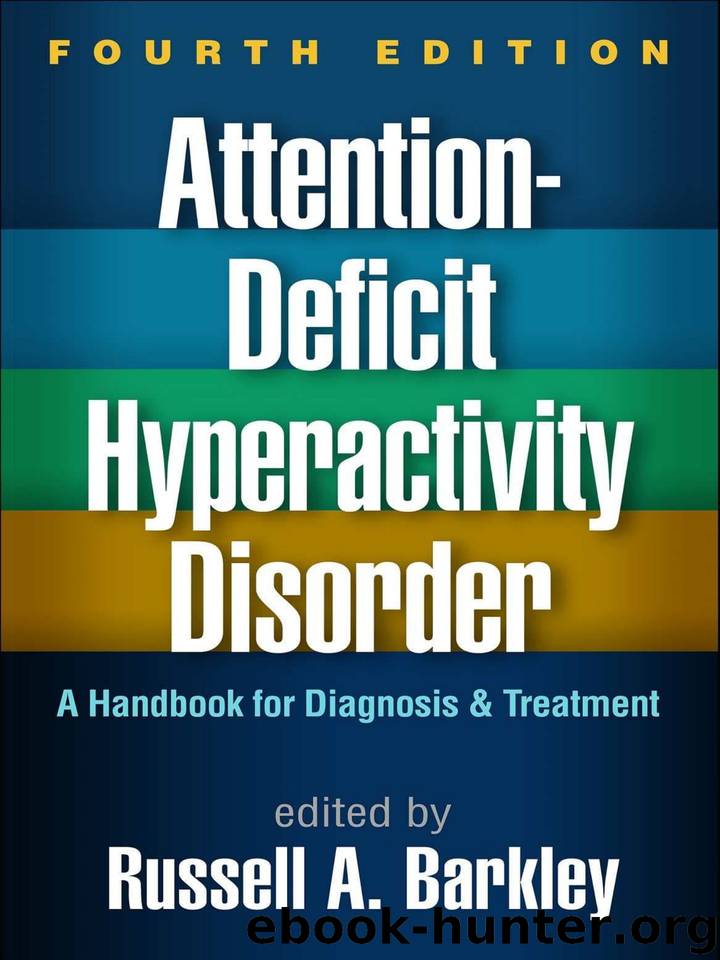Attention-Deficit Hyperactivity Disorder, Fourth Edition: A Handbook for Diagnosis and Treatment by Russell A. Barkley

Author:Russell A. Barkley [Barkley, Russell A.]
Language: eng
Format: epub
Tags: Education, Educational Psychology, Medical, Psychiatry, Child & Adolescent
ISBN: 9781462538874
Google: uB5rDwAAQBAJ
Goodreads: 40672727
Published: 0101-01-01T00:00:00+00:00
Some research further suggests that the actual capacity of the resource pool may be boosted by routine physical exercise and routine practice of tasks involving self-regulation daily for 2 weeks. From the extended phenotype view of EF as SR, these findings from the psychological literature on SR are directly pertinent to EF and its disorders.
Intervene at the Point of Performance in Natural Settings
Given previous list of considerations, clinicians should likely reject most approaches to intervention for adults with EF deficits that do not involve helping patients with an active intervention at the point of performance and across the extended EF phenotypic levels that are impaired. Onceper-week counseling is unlikely to succeed with the patient with deficient EF without efforts to insert accommodations at key points of performance in natural settings to address the impaired domains of major life activities. This is not to say that extensive training or retraining at the instrumental level of EF, as with working memory training, may not have some short-term benefits. Such practice has been shown to increase the likelihood of using EF/SR and of boosting the SR resource pool capacity in normal individuals, at least temporarily (Bauer & Baumeister, 2011).
An implication for the management of EF deficits from the extended phenotype theory is that only a treatment that results in improvement or normalization of the underlying neurological and even genetic substrates of EF is likely to result in an improvement or normalization of the phenotypic deficits. To date, the only treatment that has any hope of achieving this end is medication (e.g., stimulants or nonstimulants such as atomoxetine or guanfacine XR [extended release]) that improves or normalizes the neural substrates in the prefrontal regions and related networks that likely underlie some of these deficits, such as those associated with ADHD. Evidence to date suggests that this improvement or normalization in ADHD-related EF deficits may occur as a temporary consequence of active treatment with stimulant medication, yet only during the time course the medication remains within the brain. For instance, research shows that clinical improvement in behavior occurs in as many as 75–92% of those with ADHD and results in normalization of behavior in approximately 50–60% of these cases, on average. The model of EF developed here, then, implies that medication is not only a useful treatment approach for the management of certain EF deficits in ADHD but it may also be a predominant treatment approach among currently available treatments because it is the only treatment to date that is known to produce such improvement/normalization rates, albeit temporarily, for ADHD-related EF deficits.
Approach ADHD and Its EF Deficits as a Chronic Condition
The forgoing leads to a much more general implication of this extended phenotype model of EF: The approach taken to its management must be the same as that for other chronic medical or psychiatric disabilities. Diabetes is an analogous condition to many forms of EF deficits. At the time of diagnosis, all involved must realize that there is currently no cure for the condition. Still,
Download
This site does not store any files on its server. We only index and link to content provided by other sites. Please contact the content providers to delete copyright contents if any and email us, we'll remove relevant links or contents immediately.
| Administration | Assessment |
| Educational Psychology | Experimental Methods |
| History | Language Experience Approach |
| Philosophy & Social Aspects | Reform & Policy |
| Research |
The Art of Coaching Workbook by Elena Aguilar(51160)
Trainspotting by Irvine Welsh(21643)
Twilight of the Idols With the Antichrist and Ecce Homo by Friedrich Nietzsche(18622)
Fangirl by Rainbow Rowell(9228)
Periodization Training for Sports by Tudor Bompa(8253)
Change Your Questions, Change Your Life by Marilee Adams(7758)
This Is How You Lose Her by Junot Diaz(6877)
Asking the Right Questions: A Guide to Critical Thinking by M. Neil Browne & Stuart M. Keeley(5757)
Grit by Angela Duckworth(5604)
Red Sparrow by Jason Matthews(5466)
Paper Towns by Green John(5177)
Room 212 by Kate Stewart(5105)
Ken Follett - World without end by Ken Follett(4723)
Housekeeping by Marilynne Robinson(4436)
The Sports Rules Book by Human Kinetics(4379)
Papillon (English) by Henri Charrière(4262)
Double Down (Diary of a Wimpy Kid Book 11) by Jeff Kinney(4261)
The Motorcycle Diaries by Ernesto Che Guevara(4089)
Exercise Technique Manual for Resistance Training by National Strength & Conditioning Association(4061)
